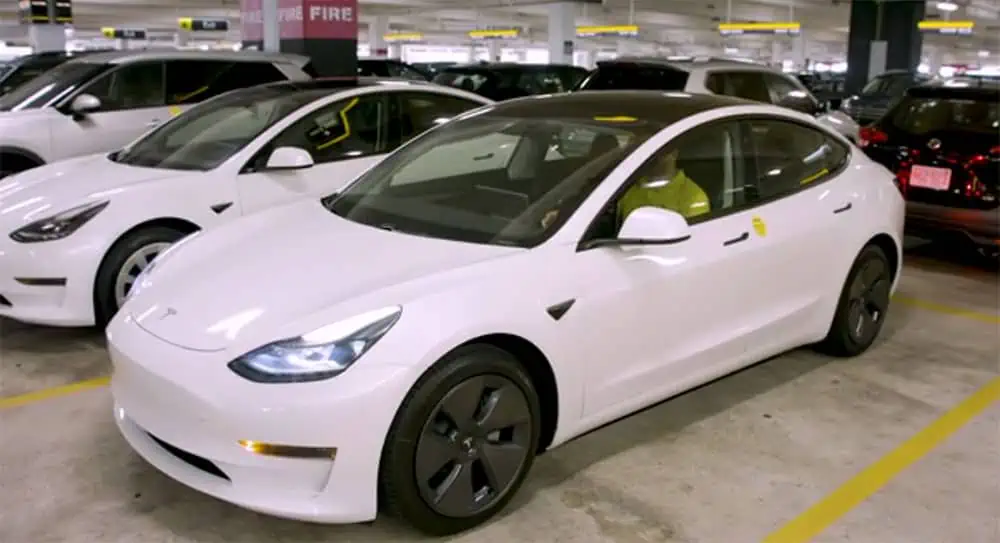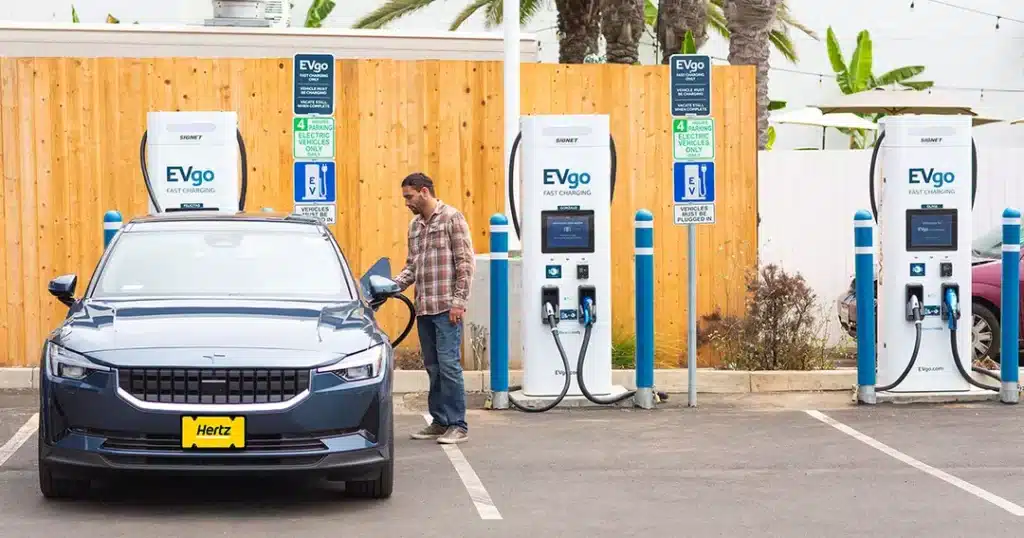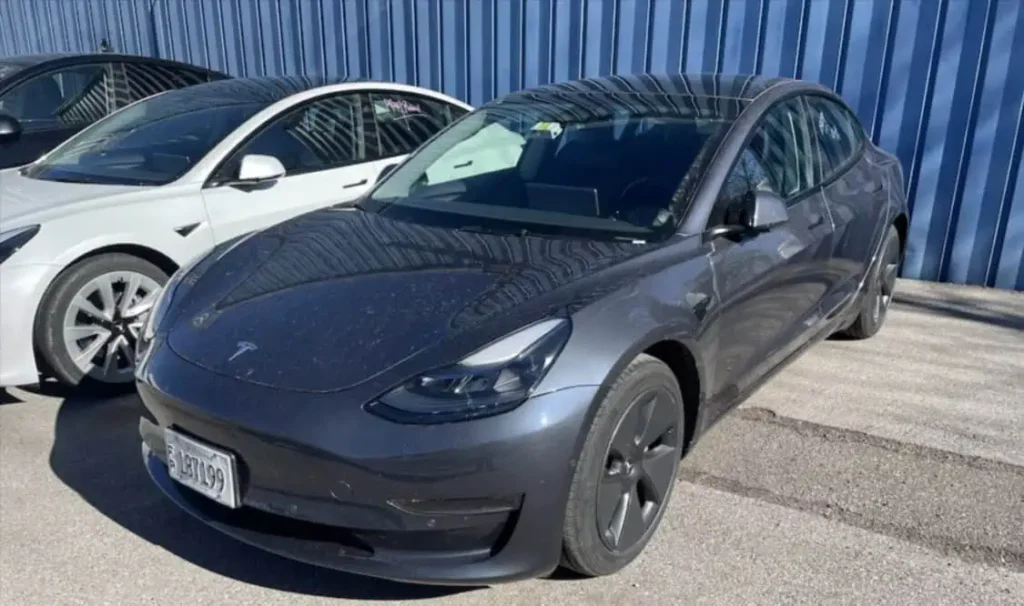Hertz EV Fleet to Decrease by 20,000, Increasing Proportion of ICE Vehicles
Hertz announced it is selling about 20,000 of its rental fleet’s electric vehicles (EVs), including Teslas, Chevy Bolts, and more. The company faced significant online backlash and reputational damage by announcing that it is selling the EVs, representing one-third of its current total fleet. The company had previously targeted 25 percent of its fleet to be electric by the end of 2024.
Two Reasons Why Hertz is Selling its EVs

Scheer gave two main reasons why Hertz is selling its EVs. One is that the company overestimated EV demand by car renters. Two, the depreciation of EVs has surpassed that of the company’s internal combustion engine (ICE) vehicles by a significant amount. Tesla’s new vehicle price cuts are likely a major cause of the EV depreciation cost losses for Hertz.
There were not enough orders for EV rentals to justify the current size of the Hertz EV fleet. The company will purchase new ICE vehicles, making the EV fleet smaller to more accurately match the current demand for EVs by the company’s car rental customers. The lack of charging and problems with public charging has most likely caused these consumers to be wary of renting EVs. Public charging is one of the most significant barriers to EV adoption.
Hertz, like other car rental companies, needs to sell off older vehicles for newer ones occasionally. When making these sales for the EV portion of the company’s fleet, it is losing too much money because of the lower resale value of the EVs. It’s a simple economic issue. Scheer mentioned Tesla’s new car price cuts, which have decreased used EV prices. Other factors have caused used EV prices to decline as well. These price decreases are great news for used EV shoppers, and some great deals exist in 2024, including on the Hertz sales page. Hertz is selling its 2-3-year-old vehicles, as car rental companies typically do.
The company wasn’t alone in over-estimating EV demand. At the end of 2023, a correction in the market occurred as Ford, General Motors, and others cut back on plans to accelerate EV manufacturing. Before that, U.S. automakers planned $100 billion in robust EV production expansions. Ford changed EV plans in the fall of 2023, announcing it was pulling back $12 billion earmarked for EV manufacturing. In Q1 2023, Ford reported losing $58,333 for every EV the company sold.
Hertz SEC Filing Dispels Rumors

Hertz’s SEC filing also attempted to dispel the rumors and protect the company’s reputation. It said: “The Company will continue to execute its strategy around EV mobility and offer customers a wide selection of vehicles. The Company continues to implement a series of initiatives that it anticipates will continue to improve the profitability of the remaining EV fleet. These initiatives include the expansion of EV charging infrastructure, growing relationships with EV manufacturers, particularly related to more affordable access to parts and labor, and continued implementation of policies and educational tools to help enhance the EV experience for customers.”
The Hertz EV Partnership with Uber
Scheer mentioned the Hertz EV deal with Uber, saying the partnership has been very profitable. Scheer didn’t note that while drivers said they loved the EVs, they also tend to drive their vehicles into the ground. This higher utilization rate of these drivers can lead to a lot of damage and wear, probably more than Hertz anticipated. Experts predict that the Hertz and Uber partnership will continue to expand. Hertz will need to work with OEMs to reduce repair costs and may need to increase rental rates for Uber drivers under the partnership.
Future Hertz EV Plans
Hertz has purchase agreements with GM and Polestar for a “significant number” of new EVs. A full 80 percent of Hertz’s EV fleet is currently Tesla models. Scherr said: “At some point the reality of EVs and Teslas being the best selling car, will at some point rend them the best rental car”.

Screaming Deals for Used EV Shoppers
The company is selling the EVs on its sales page. Some screaming deals for used EV shoppers include Tesla Model 3s for as little as $20,000, Chevy Bolts for $21,000, and BMW i3s for less than $17,000. These prices add up to considerable savings when including the federal point-of-sale tax credit of up to $4,000. Despite their high mileage, these vehicles are all still under powertrain warranty.
Hertz EV Fleet Decrease Will Not Significantly Disrupt Fleet Electrification
Fleet electrification will not suffer significant harm because of this situation. It simply represents some major adjustments by Hertz in their business plans. Experts do not believe this will decrease the sizes of other electric vehicle fleets or interfere with plans by business leaders to integrate more EVs into their fleets. It may require more thorough due diligence in studying current and future projected EV utilization for fleets, but that’s a good thing. Business entities have the need and right to remain profitable.
Those businesses commended for doing their part to fight climate change by using more zero-emission vehicles need to be given some leeway to adjust when the market dictates. In this case, there needed to be more car rental customers wanting to rent an EV at present. Many EV adoption barriers remain; one of the most important is the lack of charging stations. Another is reliability issues with charging stations. As the EV revolution progresses, these problems and issues will go away. More car rental customers will be familiar and comfortable with renting EVs. This temporary situation will be resolved, and EV adoption will continue to move forward.

Electric Vehicle Marketing Consultant, Writer and Editor. Publisher EVinfo.net.
Portfolio: BillPierce.net
